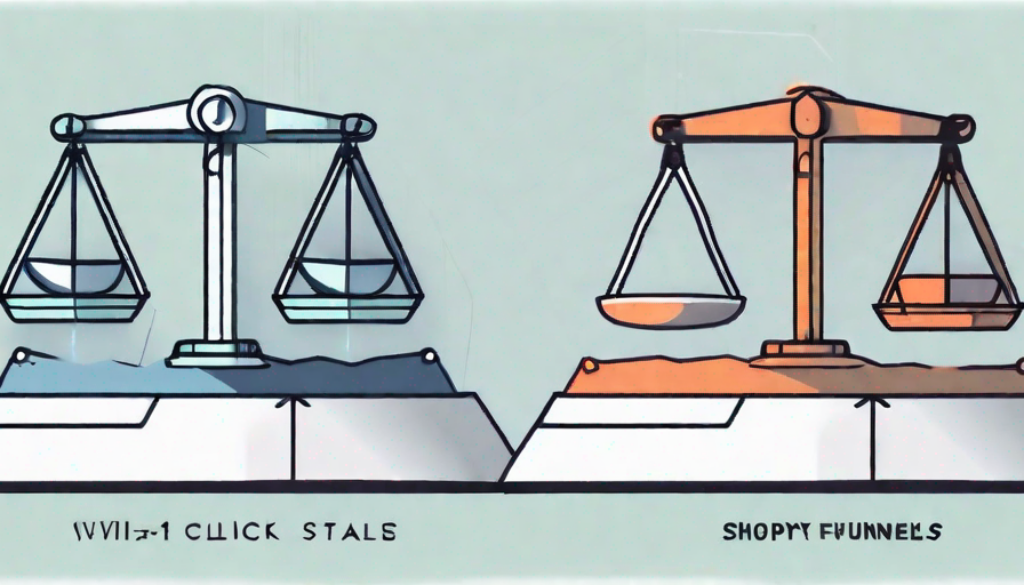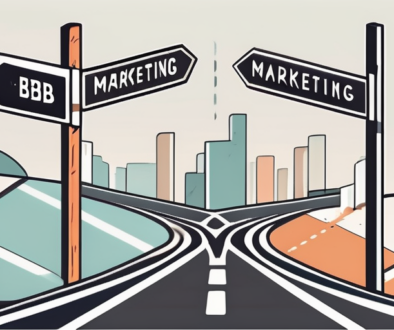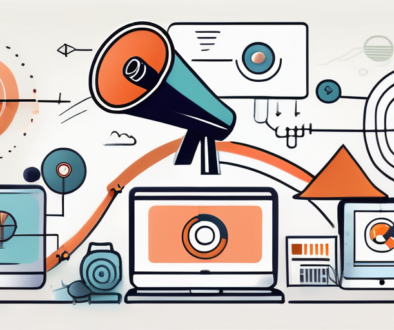ClickFunnels vs Shopify: A Comprehensive Comparison
In today’s digital age, the world of e-commerce has burgeoned, and entrepreneurs are constantly seeking platforms to showcase and sell their products online. Two popular options that often come up in this discussion are ClickFunnels and Shopify. Both platforms offer various features and benefits, yet they cater to different needs and goals. In this comprehensive comparison, we will dive into the key aspects of ClickFunnels and Shopify, including their functionalities, pricing structures, pros, cons, and user experiences. By the end of this article, you will be equipped with the knowledge to make an informed decision about which platform best suits your business.
Understanding ClickFunnels and Shopify
Before we delve deeper into dissecting the differences between ClickFunnels and Shopify, let’s start by understanding what each platform entails.
ClickFunnels and Shopify are both popular e-commerce platforms that cater to different needs and goals. While they both offer solutions for online businesses, they have distinct features and functionalities that set them apart.
Try a 14-Day Clickfunnels TrialWhat is ClickFunnels?
ClickFunnels is a powerful e-commerce tool that allows entrepreneurs and marketers to build sales funnels, capturing potential customers’ attention and guiding them through the entire buying process. With ClickFunnels, users can create high-converting landing pages, sales pages, order forms, and more – all in one place.
One of the key advantages of ClickFunnels is its focus on the sales funnel concept. A sales funnel is a step-by-step process that leads potential customers towards making a purchase. ClickFunnels provides a user-friendly interface that enables businesses to create and optimize their sales funnels without the need for extensive technical knowledge.
ClickFunnels offers a wide range of pre-designed templates and elements that can be customized to fit the brand and product. These templates are designed to maximize conversions and provide a seamless user experience. Whether you’re selling physical products, digital goods, or services, ClickFunnels provides the tools to create effective sales funnels that drive results.
What is Shopify?
On the other hand, Shopify is a comprehensive e-commerce platform that enables individuals to set up online stores quickly and easily. It provides a range of features such as customizable templates, secure payment gateways, inventory management, and marketing tools, making it an all-in-one solution for businesses of all sizes.
Shopify is known for its simplicity and user-friendly interface, making it an ideal choice for beginners and small businesses. With Shopify, you can choose from a variety of professionally designed templates and customize them to match your brand. The platform also offers a wide range of apps and integrations that allow you to enhance your store’s functionality and expand its capabilities.
One of the key advantages of Shopify is its robust inventory management system. Whether you’re selling physical products or dropshipping, Shopify provides tools to track inventory levels, manage orders, and handle shipping logistics. This makes it easier for businesses to streamline their operations and focus on growing their customer base.
In addition to its e-commerce features, Shopify also offers built-in marketing tools to help businesses promote their products and drive traffic to their online stores. From SEO optimization to email marketing campaigns, Shopify provides the necessary tools to reach a wider audience and increase sales.
Overall, both ClickFunnels and Shopify offer unique features and benefits that cater to different business needs. While ClickFunnels focuses on creating effective sales funnels, Shopify provides a comprehensive e-commerce platform for setting up and managing online stores. Depending on your business goals and requirements, you can choose the platform that best aligns with your needs.
Get a Free 14-Day Clickfunnels TrialKey Features of ClickFunnels and Shopify
ClickFunnels: Top Features
ClickFunnels offers a plethora of features that are specifically designed to optimize the sales funnel process. Here are some key features:
- Drag-and-drop landing page builder
- A/B split testing
- Integrations with popular email marketing services
- One-click upsells and downsells
- Membership site functionality
ClickFunnels is a powerful sales funnel builder that enables businesses to create highly converting sales funnels with ease. With its drag-and-drop landing page builder, users can design visually appealing and engaging landing pages without any coding knowledge. The A/B split testing feature allows businesses to test different variations of their funnels to determine which one performs better and generates more conversions.
Integrations with popular email marketing services make it seamless for businesses to capture leads and nurture them through automated email campaigns. ClickFunnels also offers one-click upsells and downsells, allowing businesses to maximize their revenue by offering additional products or services to customers after they have made a purchase. Additionally, ClickFunnels provides membership site functionality, enabling businesses to create exclusive content and offer it to their members.
Shopify: Top Features
Shopify, being an all-in-one e-commerce solution, provides various features to streamline and enhance your online store. Here are some of its top features:
- Mobile optimization
- Secure payment gateways
- Inventory management
- Customizable website templates
- Powerful analytics and reporting
Shopify is a leading e-commerce platform that empowers businesses to create and manage their online stores effortlessly. One of its standout features is mobile optimization, ensuring that the online store is fully responsive and provides a seamless shopping experience across different devices. With secure payment gateways, Shopify offers a safe and reliable way for businesses to accept payments from customers.
Inventory management is another key feature of Shopify, allowing businesses to easily track and manage their product inventory. This feature enables businesses to have accurate stock levels and avoid overselling. Shopify also offers customizable website templates, giving businesses the flexibility to create a unique and visually appealing online store that aligns with their brand identity.
Furthermore, Shopify provides powerful analytics and reporting tools that give businesses valuable insights into their store’s performance. With detailed reports and metrics, businesses can track sales, monitor customer behavior, and make data-driven decisions to optimize their online store and drive growth.
Pricing: ClickFunnels vs Shopify
When it comes to choosing the right platform for your online business, pricing is a crucial factor to consider. In this article, we will compare the pricing structures of two popular e-commerce platforms: ClickFunnels and Shopify.
ClickFunnels Pricing Structure
Start Your 14-Day Clickfunnels Ultimate TrialClickFunnels understands that businesses have different needs and budgets, which is why they offer different pricing plans to accommodate various requirements. Let’s take a closer look at their pricing options:
-
- Startup Plan: $97 per month
The Startup Plan is perfect for entrepreneurs and small businesses who are just starting out. For $97 per month, users gain access to a wide range of features and tools that can help them build effective sales funnels and drive conversions.
-
- Etison Suite: $297 per month
If you’re looking for a more comprehensive solution, the Etison Suite might be the right choice for you. Priced at $297 per month, this plan offers unlimited funnels, pages, and visitors. It also includes additional features such as email marketing automation and affiliate management.
ClickFunnels’ pricing plans are designed to cater to businesses of all sizes, from startups to established enterprises. By offering different tiers, they ensure that users can choose the plan that best suits their needs and budget.
Shopify Pricing Structure
Similar to ClickFunnels, Shopify also offers several pricing plans tailored to different business sizes and requirements. Let’s explore their pricing options:
-
- Basic Shopify: $29 per month
The Basic Shopify plan is an excellent choice for small businesses and individuals who are just starting their online journey. For $29 per month, users can set up a fully functional online store and access essential features to get their business off the ground.
-
- Shopify: $79 per month
If you’re looking for more advanced features and scalability, the Shopify plan might be the right fit for you. Priced at $79 per month, this plan offers additional features such as professional reports, gift cards, and abandoned cart recovery, allowing you to take your business to the next level.
-
- Advanced Shopify: $299 per month
For high-volume businesses and enterprises, the Advanced Shopify plan provides an extensive set of features to support growth and expansion. At $299 per month, users gain access to advanced reporting, third-party calculated shipping rates, and the ability to sell in multiple currencies.
Shopify’s pricing plans are designed to cater to businesses at different stages of growth. Whether you’re just starting out or looking to scale your operations, Shopify offers a range of options to meet your specific needs.
It’s important to note that both ClickFunnels and Shopify offer additional add-ons and integrations that can enhance your online business. These may include payment gateways, marketing tools, and third-party apps that can further extend the functionality of your chosen platform.
Ultimately, the choice between ClickFunnels and Shopify depends on your specific business requirements, budget, and long-term goals. By carefully considering the pricing structures and features offered by each platform, you can make an informed decision that aligns with your business needs.
Pros and Cons of ClickFunnels and Shopify
Advantages of Using ClickFunnels
ClickFunnels has several advantages that make it appealing to entrepreneurs:
- Easy creation of highly converting sales funnels
- All-in-one solution for funnel building and optimization
- Seamless integration with popular email marketing services
When it comes to creating sales funnels, ClickFunnels excels in providing a user-friendly interface that allows entrepreneurs to easily create highly converting funnels. With its drag-and-drop editor, you can effortlessly design and customize your funnels to suit your specific business needs. The platform also offers a wide range of pre-designed templates that you can choose from, saving you time and effort in creating your own funnel designs.
Furthermore, ClickFunnels is an all-in-one solution, meaning you don’t need to integrate multiple tools or services to build and optimize your funnels. From landing pages to order forms, ClickFunnels provides everything you need to create a seamless customer journey and maximize your conversion rates.
In addition, ClickFunnels seamlessly integrates with popular email marketing services, allowing you to easily capture leads and nurture them through automated email campaigns. This integration streamlines your marketing efforts and helps you build a strong relationship with your audience.
Disadvantages of Using ClickFunnels
Despite its strengths, ClickFunnels also has some drawbacks:
- Relatively higher pricing compared to other platforms
- Steep learning curve for beginners
- Limited customization options beyond the provided templates
One of the main disadvantages of ClickFunnels is its relatively higher pricing compared to other funnel building platforms. While it offers a range of features and functionalities, the cost may be a barrier for entrepreneurs on a tight budget.
Moreover, ClickFunnels has a steep learning curve, especially for beginners who are new to funnel building. The platform offers extensive training resources, but it may still take some time and effort to fully grasp all the concepts and techniques involved in creating effective funnels.
Additionally, ClickFunnels provides a variety of templates for you to choose from, but customization options beyond these templates are limited. If you have specific design requirements or want to create a unique funnel layout, you may find yourself restricted by the platform’s limitations.
Advantages of Using Shopify
Shopify, too, offers many benefits to its users:
- User-friendly interface, making it accessible to beginners
- A wide range of customizable themes and templates
- Robust inventory management and order tracking
One of the key advantages of Shopify is its user-friendly interface, which makes it accessible to beginners with little to no technical knowledge. The platform provides a straightforward setup process, allowing entrepreneurs to quickly launch their online stores and start selling products.
Furthermore, Shopify offers a wide range of customizable themes and templates, giving you the flexibility to create a visually appealing and unique online store. Whether you’re selling clothing, electronics, or handmade crafts, you can find a theme that suits your brand and customize it to match your desired aesthetic.
In addition, Shopify provides robust inventory management and order tracking features. You can easily keep track of your stock levels, set up automatic notifications for low inventory, and manage your orders efficiently. This helps streamline your operations and ensures a smooth fulfillment process for your customers.
Disadvantages of Using Shopify
However, Shopify does have its downsides:
- Additional transaction fees if you don’t use Shopify Payments
- Limitations in advanced customization options
- Scaling costs as your business grows
If you choose not to use Shopify Payments as your payment gateway, Shopify imposes additional transaction fees on each sale. While these fees are relatively small, they can add up over time and impact your overall profitability.
Moreover, while Shopify offers a range of customization options, there are limitations when it comes to advanced customization. If you have specific design requirements or want to implement complex functionalities, you may need to rely on third-party apps or hire a developer to achieve your desired outcome.
Lastly, as your business grows and generates more sales, you may face scaling costs with Shopify. The platform offers different pricing plans, and as your store’s traffic and sales increase, you may need to upgrade to a higher plan to accommodate the growing demand. This can result in higher monthly fees, impacting your overall profitability.
Ease of Use: ClickFunnels vs Shopify
User Experience with ClickFunnels
The user experience with ClickFunnels can vary depending on your familiarity with sales funnels and marketing automation. While it provides numerous resources and training materials, beginners may find the learning curve steep. However, once you grasp the concepts and functionalities, building and optimizing funnels becomes more intuitive.
User Experience with Shopify
Shopify is widely known for its user-friendly interface and ease of use. The platform offers a straightforward setup process, intuitive dashboard, and extensive documentation to guide you along the way. Even those without technical expertise can navigate and operate their online stores hassle-free.
In conclusion, both ClickFunnels and Shopify hold their own when it comes to e-commerce solutions. ClickFunnels excels in its ability to create high-converting sales funnels, while Shopify offers a comprehensive suite of features for building and managing an online store. The choice between the two ultimately depends on your business goals, budget, and expertise. Consider your specific requirements and weigh the pros and cons highlighted in this comprehensive comparison to make an informed decision that propels your business towards success.
Unlock Clickfunnels: Start a 14-Day Free Trial Today


